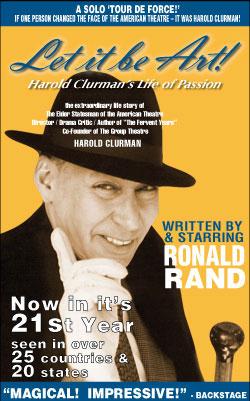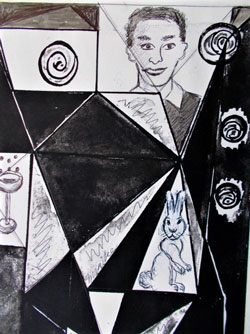Dennis D’Amico
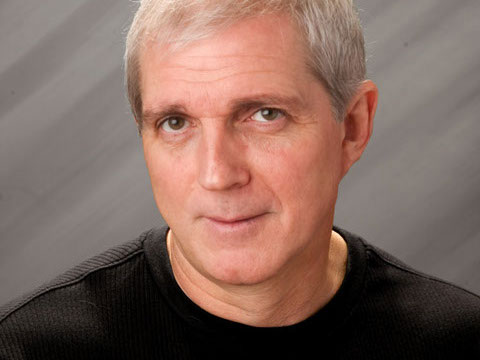
is the Co-Executive Producer of the new opera “IBSEN,” with a libretto written by Ronald Rand and music by Hartmut von Lieres, scheduled for its World Premiere in India and an Asian Tour in November, 2021. Mr. D’Amico was the Executive Director and Executive Producer of “The Garland Music Series” and “The Garland Appeal USA” commemorating Linda McCartney’s fight with cancer through the healing power of music, supported by Sir Paul McCartney. He produced the World Premiere of Sir Paul McCartney’s classical composition “Nova” at Buenos Aires’ Teatro Colon. Mr. D’Amico has cast many Broadway shows including “Singin’ in the Rain,” “Fiddler on the Roof,” “It’s a Wonderful Life,” “Miss Firecracker Contest,” “Three Musketeers,” and “Into the Light.” His work in film includes Best Picture “Out of Africa,” “Santa Claus the Movie,” “9½ Weeks,” and “A Woman or Two.” Mr. D’Amico contributed his many talents to “Strange Interlude” on Broadway starring Glenda Jackson, and “Aren’t We All” with Rex Harrison and Claudette Colbert. Every year he produces charity events that raise hundreds of thousands of dollars for breast cancer, children’s cancers, autism, scleroderma and animal’s rights. Mr. D’Amico has performed with several artists including Nigel Kennedy, REO Speedwagon, The Marshall Tucker Band and Fred Turner of Bachman Turner Overdrive. As a jazz producer, he has worked with Kenny Rankin, Chevy Chase, Dorado Schmidt, Peter Beets, Cassandra Wilson, Tom Scott and Pablo Ziegler. Mr. D’Amico was Executive Producer of the Michael Madsen film, “Turning the Tables” with Daryl Hannah. He produced “The Believe Concert” starring Chevy Chase and Danny Aiello to raise funds for children with cancer. Mr. D’Amico produced the “Let Us In” concert with Kenny Loggins, Steel Magnolia, and Jeff Daniels. He is currently producing a new play co created by Tony Award winning writer Mark Medoff and Dennis entitled “Baby Lamb.”
You’re a prolific composer of over 1000 songs, music and lyrics. Was music a large part of your growing up?
Music was always playing in my house when I was growing up. My Mother and Father would listen to the big bands, Frank Sinatra, Andy Williams, Nat King Cole and Tony Bennett, all the crooners. There was a wide spectrum of types of music including classical music, but not a lot of opera.
The first influence to shake me up was listening to Elvis Presley. And then The Beatles arrived. Listening to them was probably the biggest influence. I related to their music. They seemed to spark something in me to play the guitar, and then to eventually writing music. Wherever I was, whether I was in shower or anywhere, I’d be singing The Beatles, and then along came The Beach Boys. I loved their harmony.
I began creating and singing my own songs in the shower, whatever came into my heard. That’s how my songwriting began. I got a guitar and began creating tunes, trying to play in my own style. I taught myself, and really don’t try to do a take-down of anyone else’s style; it’s my own arrangement, and it works for me.
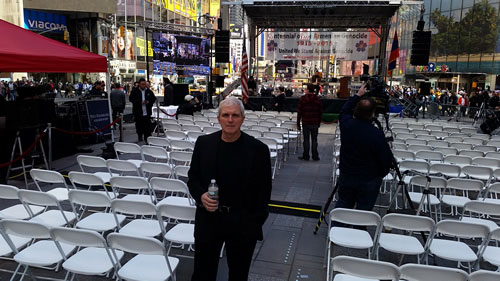
Dennis D’Amico & his production company, I Do Music, was part of the production team that presented the “Armenian Holocaust Tribute” in Times Square, New York City
What are some of the keys you’ve discovered that makes a song work?
Certainly the ‘hook,’ whether it’s a lyrical or a musical hook. The right melody can grab you, and when you put harmony into it, it creates even more of that attraction. Instrumentation can also help create more of the uniqueness. That’s what attracted me to The Beatles before I knew what harmony was. Their voices, it’s a three-part harmony, the way they stack their harmonies. I had discussions with Sir George Martin, who produced The Beatles. He was a most humble man and my dear friend. He told me, “The lads (Paul McCartney and John Lennon) could sing. They could harmonize.” I have a feeling he did construct some of the songs for them during the recording sessions.
In a song I think you’ve got to have something that sounds familiar. We really all borrow from each other, perhaps two notes from this song, a note from another song. It doesn’t happen consciously. And you have these glorious operas. When you hear the construction of the notes, they are so gorgeous they can tear your heart out. Music is the only invisible art form; it hits you and you remember exactly where you were when you first heard a particular song. It also creates a problem. The young people today don’t look at its value, and they’ll just grab it and manipulate it. They want it all for free.
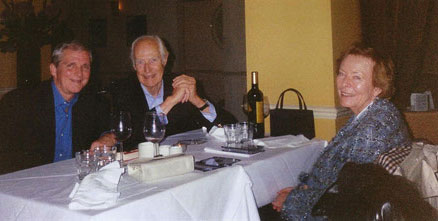
Dennis D’Amico with Sir George Martin and his wife, Judy
You’re currently involved in the making of the World Premiere and Asian Tour of the first opera written about the great Norwegian playwright, Henrik Ibsen, with a libretto by Ronald Rand and a score by German composer, Hartmut von Lieres. What drew you to the opera, and why do you feel the world needs to hear and experience this new opera, “IBSEN,” especially today?
What attracted me to the opera is that it’s an empowering piece and empowering to women. I like that fact. Ibsen was a proponent of women’s right before it was even discussed. I think in the cities we’re going to bring “IBSEN,” it will be a great way to present women in an empowering manner through the arts. It’s how art can change people more than politics.
The arts can open people’s minds to change in a much more attractive way; they can give us a ‘key to life.’ If we look at historic civilizations, it’s through their architecture, their paintings, the art they’ve created, their jewelry, the relics they created. Art is a universal language that promotes peace and understanding. It is timeless.
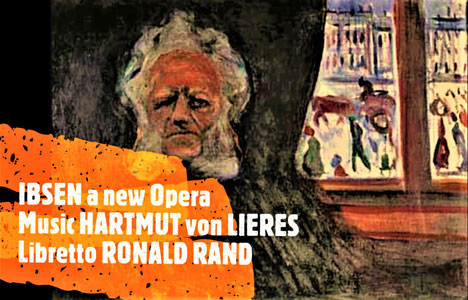
“IBSEN” a new opera, libretto by Ronald Rand, music by Hartmut von Lieres
What are some of lessons you’ve discovered forging a career in show business, while also maintaining the integrity of the art form?
I think, most importantly, for any actor, for any artist or musician, you have to really love what you do. If you’re just looking for fame, you may be in the wrong business. This business is about passion. I didn’t have a choice; it was what my inner being wanted. I knew early on. Maybe I’m lucky, maybe I’m cursed, and sometimes the business hasn’t always been good, but I’ve been pretty successful. I was never ‘money-motivated.” I had to love the project whatever it was that I was working on. I love working with the artists and how we work together to produce a record or theatrical play or film.
As I have worked on each project, I became more in touch with what ‘having an open mind’ really means. It’s important to learn how to grow your network with others who know more than you do, how to stay in touch with people, how to absorb everything like a sponge, how important it is to work at your craft every day as a musician. I was never without a tape recorder. I might be thinking of a song and I would have to get over the embarrassment of creating the moment in public.
Because creation or an idea for a story will come when it does. All the same you have to capture it. It’s about loving about what you do. It’s really the way to learn. I was always working to grab what I could. I’d learn a lot when I was a casting director, when I was teaching acting classes, from watching and seeing because every day is a learning experience. You can’t lose that edge; I’m always striving to be a better singer, a better producer, a better composer a better producer and better guitar player, really a better human being.
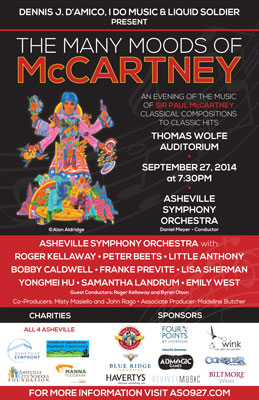
You have also worked on some exciting films film including “Out of Africa,” “Santa Clause the Movie,” “9 ½ Weeks,” among many others. What are some of the important differences you have discovered between working on a stage production and working on a film?
There are some similarities whenever you’re trying to get something produced, but the two mediums are so different. First, something on stage is going to be too big for a film. Film is much more subtle, and on stage the first row may see it, but you have to reach the entire theater. Second, it takes a different approach. Still, a good story is a good story. That’s what it comes down. To look for the story, the character, the development and the conflict. It lends itself to the stage in a different way than on film.
A film like “1917,” would be much more confined on stage, and the story would need to be told in a different way, similar to the way “War Horse” was done. It was a great production but when it is transferred to film, there is an entirely different direction you can go.
Today, a lot of films go from the screen to the stage, being translated into a Broadway shows, like “Tootsie,” “Mrs. Doubtfire, “Pretty Woman.” Back in the 1930’s and ‘40’s, it was ‘stage to screen,’ that was the thing. I just want to see more originality, more than something that’s already been done.
You’ve also worked with many extraordinary singers, song writers and musicians. What do you feel makes a great collaboration work?
With creating my music, it’s never been really easy on my compositions. I’ve pretty much done the lyrics and the music. I’d run it past my musician friends to see what they think. I’m actually working on a new project with Nikki Fernandez. We’ve had really good sessions; they’ve been very comfortable. It may not always be that way.
Musicians are an interesting breed; they can be all over the place. I’m really good collaborator for theater and film, with my own and someone else’s pieces. I’ve written 99% of my music myself, very late at night. I don’t know how many people want to get together at midnight and work until 4am. Now that I’ve gotten older, my doctor says get to bed earlier.
Collaborating with music has been a challenge for me. When it comes, my music just pours out. Maybe it’s because you’re channeling something, I don’t know. We’re always trying to bring something to a tune, not trying to mimic someone else’s music. I hear things differently in a different time, so I have to slow it up to find the right groove, to invert the chord structure that fits what I’m feeling. Everything is exploration and every time is like a new journey.
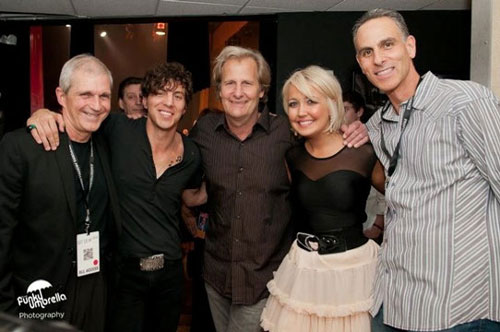
Dennis D’Amico with ‘Steel Magnolia’, Jeff Daniels and David Ross from Reviver Music
What does it take to be an Executive Producer and how do you keep it all under control?
It means what you do is like a captain on a ship. You want the entire crew to respect one another because we all have this talent, and it’s all about creating a team and really working in sync with each other. It’s about keeping the relationships simpatico. We’re all artists working on the production, putting it all together with the set, lighting, costumes, and there can be issues, but nothing is a problem. I look for solutions, not “Houston’ we have a problem.”
I think it’s up to all of us try to work together to find your way home. It’s about solving issues. I have to make sure everyone gets along in the time frame that is demanded. Sometimes it’s tough when you get into the tech days. You’re there for sixteen hours and tempers can flare up. I’m trying to remain open to anyone’s suggestions, to create an atmosphere, conducive to performers to give their very best, to get the greatest performance possible, and let everyone know they’re an important part of the project.
There needs to be that kind of collaboration. If someone wants to try a different approach, I always make people justify why they want to do it that way. I remain open to figuring out how to make it work together, whatever it takes. Then it’s refinement and polishing.
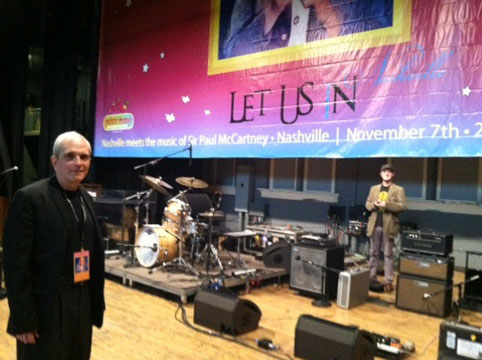
Dennis D’Amico, producer of “Let It In” onstage at Ryman Auditorium
What was the process like producing Mark Medoff’s new play, “Baby Lamb,” which tells the story of Lena Pepitone, who was a close friend of Marilyn Monroe.
Every day we rehearsed, there were new pages of dialogue. Mark was always re-writing at night. He’d send me the new pages. Mark was a diligent writer. Very disciplined, every day he was up at the crack of dawn. He was just great with dialogue, and he also directed the show.
There were also times that things were not working for me. I had done the interviews with Lena and I knew the way Mark had written it, Lena wouldn’t have it that way. I had promised her I would tell the truth. Anything that’s in the show I have on film. I’m not taking poetic license. We’re still working on it, and there have been speedbumps but we’ll eventually get there.
You’ve also been actively involved in concerts to help others in this world - producing “The Believe Concert” starring Chevy Chase, Danny Aiello, Bobby Caldwell, Tom Scott, Kenny Rankin, Hilary Kole and Roger Kellaway, with a seventy piece orchestra and eighty voice gospel choir at the Orpheum Theater to raise funds for children with cancer. You also produced the “Let Us In” concert at the Ryman Auditorium in Nashville, including Kenny Loggins, Chuck Wicks, Sarah Darling, Steel Magnolia and Jeff Daniels. Why has this meant so much to you personally?
It’s ‘giving back,’ that’s number one. It strikes me in such a helpless place when I see children suffer. I wish I was a multi-billionaire and I could help all these kids. I’m a sentimental guy; I love people. I want to see people happy. When I see parents with a child who needs help, I know I’ve been blessed in my life to have a healthy, beautiful15-year daughter and a beautiful wife. I think if there is any way to make life more beautiful for others, I want to be there. You have to give back when you’re doing these concerts. It really does help you look at the world today and know we have to act globally because we’ve become so connected more than ever. We have to be in touch with each other pulses. How can we help?
With your new opera, “IBSEN,” it’s about going out to help people see there’s so much more that can be done to empower women and empower people. I’ve never seen an opera like this where you can change people and make them feel positive about change. That’s what makes the world go round.
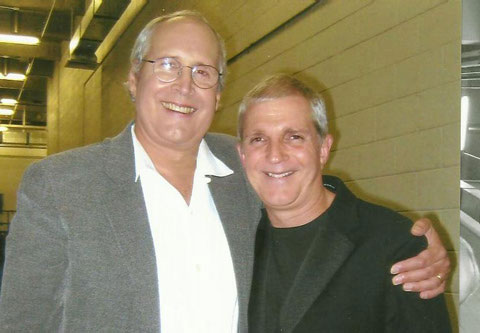
Dennis D’Amico with Chevy Chase
Around the world we’re faced with a great and unnerving challenge, what role do you feel music can play in helping us at this moment?
I certainly hope music today could go deeper and strike people in a much more respectful place, more than just being about money or sex, but be able to create a different perspective, with a serious composition, and be more passionate, so more time and thought is needed to put into the music that’s being created. Where’s the next Paul McCartney or John Lennon, the next Elton John, the next Joni Mitchell?
We should be creating a more compelling life that changes music. That is much more important than being on a record label. It’s really about the artist introducing us to something that’s timeless. And I enjoy helping young artists in every way. It’s rewarding when something exciting appears. If you listen to “Penny Lane,” you can see how brilliant a writer McCartney and Lennon were. They composed it when they were so young.
When you hear a beautiful tune, it’s a testament; people will listen to it for years to come. And it’s up to the songwriters and musicians to keep adding to the songbook and keep on creating something new and compassionate.
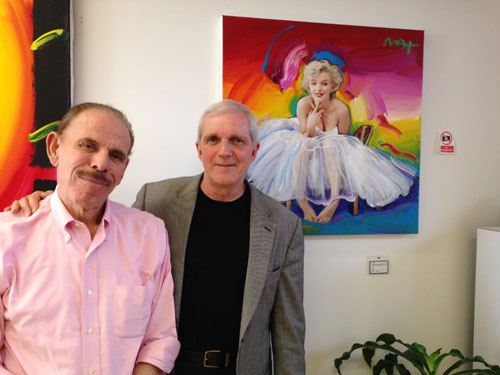
Dennis D’Amico with Peter Max









































